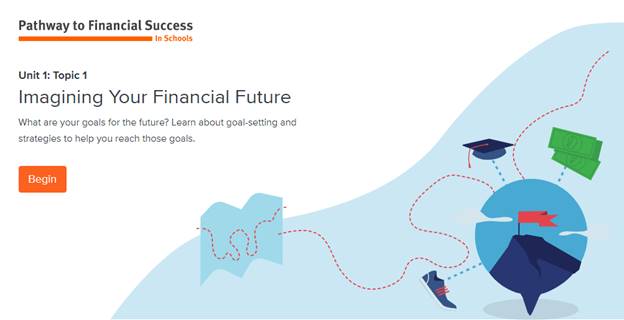Being Financially Responsible

Sponsored by
Discover and Discovery Education
Unit Overview
Being Financially
Responsible provides a foundation for students to
explore a wide variety of personal finance topics. The unit begins with an
introduction to personal goal setting and the importance of setting SMART
goals. Students then examine their personal money habits including how they
were established and the impact having good money habits can have on their
future. Next students learn about budgeting and discover why it is important to
track one’s income and expenses. The unit concludes with a look at students’
everyday spending decisions and the impact their daily choices can have on
their financial future.
Section
A - Imagining Your Financial Future
What
does the future hold for you?
How
will your goals change over time?
You will learn about goal
setting and how one’s goals for the future (i.e., job, relationships, social)
will likely vary at different life stages.
Complete the learning module below and keep any necessary notes.
Section B – Setting Smart Goals
Improving your financial
life requires planning, and that starts with setting goals that are Specific,
Measurable, Achievable, Realistic and Time-bound (SMART).
|
Smart Goal Guide |
|
|
Specific |
·
What exactly needs to be
accomplished? ·
Who else will be involved? ·
Where will this take place? ·
Why do I want to accomplish the
goal? |
|
Measurable |
·
How will I know I’ve succeeded? ·
How much change needs to occur? ·
How many accomplishments or actions
will it take? |
|
Attainable |
·
Do I have, or can I get, the resources needed to
achieve the goal? ·
Is the goal a reasonable stretch for me? (neither out
of reach nor too easy) ·
Are the actions I plan to take likely to bring
success? |
|
Relevant |
·
Is this a worthwhile goal for me
right now? ·
Would it prevent me from achieving an
important goal? ·
Am I willing to commit to achieving
this goal? |
|
Time-bound |
·
What is the deadline for reaching
the goal? ·
When do I need to act? ·
What can I do today? |
Below are some examples of
financial goals. Look over them and be
prepared to share your goals with a “financial buddy” and set specific dates to
check-in on progress.
Short-Term Goal: I want to save $200
in an emergency fund every month for the next 12 months. I will report my progress on the last
Monday of the month to my financial buddy.
Medium-Term Goal: I want to save $10,000
over the next three years for a house down payment. I will check in with my financial buddy every
three months.
Long-Term Goal: I want to invest at least $5,000 per year
in my retirement funds for the next five years. I will check in with my financial buddy every
six months.
